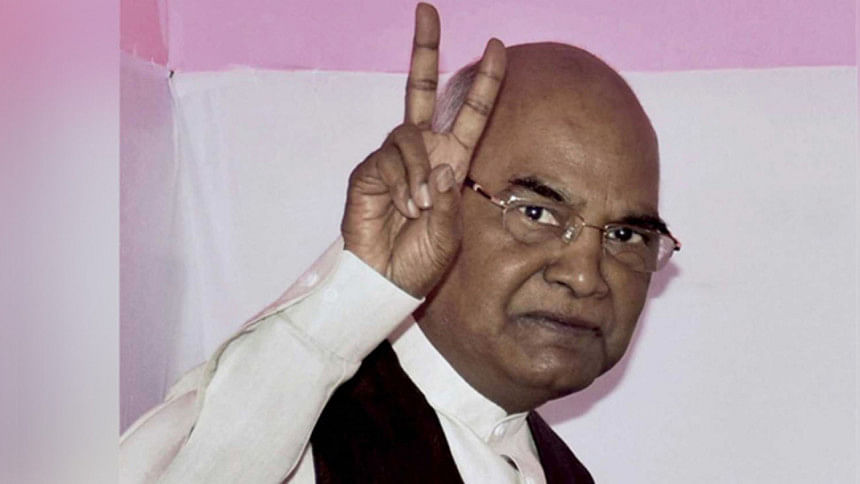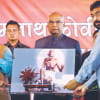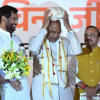Ram Nath elected new Indian president

Ram Nath Kovind, the candidate of India’s ruling Hindu nationalist Bharatiya Janata Party, was elected as the country’s 14th president today with an overwhelming majority of votes from the country's lawmakers.
Kovind, 72, defeated opposition's nominee Meira Kumar, a former diplomat and parliament Speaker, garnering more than 65 percent votes in an electoral college, Returning Officer Anoop Mishra announced after manual counting of votes.
Kovind will be sworn in as president on July 25, a day after the five-year tenure of incumbent Pranab Mukherjee ends.
A commerce graduate and a lawyer by training, Kovind, who will be the second Dalit to hold the top constitutional position and the first BJP member to be elected president, received 2930 votes with a value of 702,044 while Meira Kumar, also a Dalit, polled in 1844 votes with a value of 367,314, Mishra said.
The electoral college for the presidential election comprises of members of parliament and members of legislative assemblies of all states.
Ninety-nine percent of a total of 4,896 voters -- 4,120 MLAs and 776 elected MPs –exercised their franchise through secret ballots in the polling held on Monday last.
While the value of an MLA's vote depends on the population of his or her state, the value of an MP's vote remains the same at 708.
The polling was marked by cross-voting in various states where many opposition members favoured Kovind.
Kovind, who has roots in RSS, the ideological fountainhead of BJP, enjoyed the support of all BJP allies besides several regional parties including Janata Dal (U) which had broken ranks with the opposition and supported him.
Kumar was backed by main opposition Congress and several other parties in a contest that Congress chief Sonia Gandhi termed as an "ideological battle" against the ruling party.
Kovind’s election as president is expected to help Modi tighten his grip on India’s power structure. Although executive power is wielded by the prime minister under India’s constitution, the president can be an important figurehead, particularly in times of turmoil and flux in the event of clear majority to any party or combination of parties in general elections as it is the president who decides who is in the best position to form government first.
BJP can hope to have its own man as vice president also when the elections for the second highest constitutional post are held on August 5 to succeed Md Hamid Ansari.
In the coming contest, in which members of the two houses of parliament—Rajya Sabha and Lok Sabha—cast their votes, BJP has fielded its former chief M Venkaiah Naidu against joint opposition candidate Gopalkrishna Gandhi, grandson of Mahatma Gandhi, Father of the Nation.
Prime Minister Narendra Modi congratulated Kovind on his electoral victory. "Gladdened by the extensive support for Shri Ram Nath Kovind Ji among MPs & across various states," Modi tweeted and recalled his long association with the President-elect.
In his first comments after the presidential elections results were declared, Kovind said his election as president is evidence of the greatness of Indian democracy.
The victory of Kovind, who is the second Indian President from extremely backward caste after K R Narayanan, was a foregone conclusion because almost 40 political parties, including many from outside the NDA-fold, had pledged their support for him, accounting for over 70 per cent of the electoral college.
Born on October 1, 1945 in Kanpur dehat district, Kovind belongs to Dalit community Koli and had been BJP’s Scheduled Caste Morcha chief (1998-2002) and President of the All-India Koli Samaj.
Kovind’s choice as BJP’s presidential candidate had surprised political watchers and is considered an astute move for a party working overtime to expand its social base beyond its traditional constituencies of upper castes to new areas in India’s social hierarchy.
As a lawyer, Kovind practised in the Delhi High Court and the Supreme Court. He was also the federal government's standing counsel in the apex court from 1980-93.
He was elected to the Rajya Sabha, upper House of parliament, in April 1994 from Uttar Pradesh and served there two consecutive terms till March 2006.
As an advocate, Kovind took the lead in providing free legal aid to weaker sections, especially of backward castes and tribals and needy girls under the aegis of the Free Legal Aid Society in Delhi.
He is also known for his work in the field of education, he served as a member on the board of management of the Dr BR Ambedkar University, Lucknow, and was a member of the board of governors of the Indian Institute of Management, Kolkata.
Kovind has a wife Savita and the couple, who got married in May, 1974, have one son and a daughter.

 For all latest news, follow The Daily Star's Google News channel.
For all latest news, follow The Daily Star's Google News channel. 





Comments